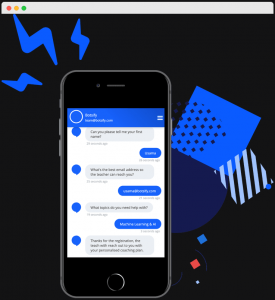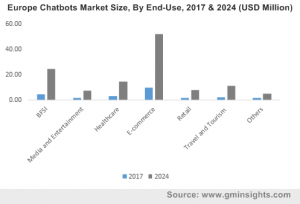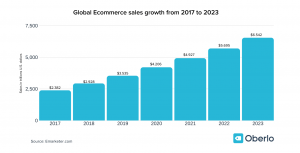E-commerce has come a long way since 1994 and is growing as more customers use devices and computers as their most important tools to find and purchase new products. In 2040, 95% of purchases are expected to be made through e-commerce companies. This figure shows that eCommerce marketing is going nowhere. As an e-commerce company, it may be the music you hear.
But how is your e-commerce marketing strategy? Is it on point or not?-This e-commerce Marketing Guide will help you understand why your online store is successful and how to effectively create a marketing plan. Let’s get started and dive into the pool of e-commerce knowledge with this guide and boost up your business instantly…
This Guide Contains…

Before we dive deeper into what e-commerce marketing is and how to implement your strategy, let’s take a look at the definition of e-commerce advertising and e-marketing parity in e-commerce companies.
A Short Close Look at E-commerce Marketing
E-commerce marketing is about raising awareness and acting on companies that sell products or services electronically. Ecommerce marketers can use social media, digital content, search engines, and email campaigns to engage visitors and promote online shopping.
Types of e-commerce marketing
To give you an idea of what your eCommerce marketing strategy looks like, here are a few common marketing channels and how to use them to build your online store.
E-commerce Social Media Marketing
Brands, publishers, entrepreneurs, and growing businesses are launching pages on today’s most popular social media platforms to connect with their audience and publish content that engages their audience.
E-commerce marketers can do the same, but the campaigns they run may be slightly different, and not all social networks are suitable for your needs. The eCommerce website is very visual. In the end, you have to show the product. So, your success on social media depends on your product pages and how you use your images to get traffic.
Content Marketing
When you hear the word “content marketing,” you can think of blog writing and video marketing, content designed to increase your website’s search engine rankings and answer industry-related questions. But if you are selling your product online, do you need articles and make videos to create a deal? You know for sure.
Here are some of the ways you can use your content to promote your e-commerce store.
- Optimize your copy of the product page.
- Write related blog posts.
- Write guest posts for external websites.
Search Engine Marketing
Search Engine Marketing (SEM) includes Search Engine Optimization (SEO) and Paid Advertising. SEO relies on our knowledge of Google’s content algorithms to optimize their content, but SEM can include pay-per-click (PPC) campaigns, Display Network campaigns, or product-specific advertising campaigns (e.g. Google Shopping). You can pay for the first job on the search engine results page.
PPC campaigns on Google allow potential buyers to see a link to your page as they enter search terms that match your campaign conditions. However, it should be profitable because you pay Google for each time a user clicks on a result. This is why e-commerce marketers often sign up for Google AdWords and market their product pages as PPC campaigns. This campaign places a search engine right in front of a company product when clicking on paid results, increasing the likelihood that searchers will purchase before leaving the company website.
Email Marketing
Email marketing is one of the oldest forms of digital marketing and, believe it or not, it has special value in the e-commerce world. This can be automated. Automation means you can create successful drop-in campaigns for subscribers categorized by interests or milestones and make your email campaigns phenomenal. It’s a little marketing tactic to worry about with long to-do lists. For those looking into automation tools, consider checking out ConvertKit or TinyEmail.
However, it is important to carefully build your email list to maintain trust among potential customers. When data protection is on the Internet user’s top priority list, not all sales letters are welcome in the user’s inbox. Ecommerce marketers need to pay attention to when and how they add website visitors to their email list.
Value of Ecommerce
Benefits of a Perfect E-commerce Strategy
E-commerce is not a trend and will not disappear soon. Why? Selling goods and services online is a huge boon for sellers and buyers.
- Faster and easier transactions
- Informed buying decisions
- Easy price and product comparison
- Delivery process improvement
- Directed communication
- Reduces costs by eliminating the need for bricks and mortar
- Opportunity to sell products around the clock (compared to existing business hours)
- Opportunity to reach customers outside of their geographic location
- More control over the sales and tracking process, especially if one port offers Point of Sale (POS), To make it even simpler
- Improve leader visibility through SEO
- More control over labor and inventory management
Boost up your E-commerce Platforms
Gather quality leads and 10x your ROI with automated chats
Latest E-commerce Trends Around The World
The biggest trend in e-commerce right now is growth and this growth is spreading everywhere.
1. E-commerce growth in the US
Over the past decade, the United States has experienced tremendous growth in e-commerce. In fact, according to data from the U.S. Department of Commerce, U.S. e-commerce sales grew faster in 2017 than after 2011, accounting for 49% of total retail sales. The growth trend also does not slow down. According to statistics, by 2024, retail sales of physical goods online in the United States will reach nearly $477.5 billion.
2. Growth of global e-commerce
Global e-commerce is also growing rapidly. According to Emarketer’s trending data, e-commerce sales could exceed $4.58 trillion by 2020. E-commerce sales are on the rise worldwide as more customers search for products in overseas and international markets.
3. E-commerce growth by category
According to ComScore data, several specific industries are showing a drastic change in the growth of e-commerce. Jewelry and watches rose 39% to top the growth chart (2016), followed by furniture, appliances, and equipment (26%), and video games/accessories (24%).
Best E-commerce Marketing Practices
What Should You Know About Ecommerce Marketing? Here’s how to get started.
-
Test your social media.
Facebook has 1.18 billion daily active users and a large number of potential customers to use. Consider targeting your audience with social media posts and videos and experiment with what works best and drives sales and revenue.
-
Collect email addresses and keep in touch.
According to the latest data, three-quarters of businesses agree that email marketing provides a good ROI. VIP offers, sales, discounts, and more to visitors by collecting email addresses from the website and asking customers to subscribe to future email lists.
-
Use Personalization to customize your tips/messages.
For online customers, customization is more important than ever. Research shows that 74% of online users are dissatisfied with their website when offers, ads, and promotions that are not related to their interests become apparent.
Use personalized product tips, customize your email marketing activities, and generally try to make every customer feel they’re talking to you.
-
Use surveys to gather feedback.
The best way to keep track of what your audience wants is to ask them. Use online surveys to collect feedback on everything from products to marketing and customer interactions.
-
Use Artificial Intelligence in Ecommerce
Artificial intelligence can help you optimize your e-commerce site. Artificial intelligence can enhance the user experience for customers. AI marketing strategies can attract customers. This can increase the active flow of customers to your online store.
You can use AI to accelerate marketing and create personalized marketing campaigns. With this technology, consumers can get business. It also helps in automating marketing campaigns. Reduce marketing time and increase marketing accuracy through automated marketing campaigns.
Here are some important e-commerce marketing applications that utilize AI elements.
Product recommendation
Depending on consumer buying activity, artificial intelligence can provide interesting recommendations to all customers. You can retain your customers by giving them the products they love. Artificial intelligence can help. This tool can remember your purchases and browsing history, as well as your actions on the Internet. With this understanding, AI can develop recommendations and suggestions for customers.
Write strong titles
The subject line makes an impression on the text. You can use artificial intelligence to create interesting and engaging themes. Key applications that can be used in AI elements can create attractive themes for e-commerce marketing strategies.
Downtime to communicate with customers
Time to reach your customers plays an important role in digital marketing. AI can track consumer behavior in this regard. You can decide the best time to contact a specific customer. Thanks to this, you can optimize your email campaigns.
Email list
Custom marketing campaigns require a segmented list of customers. You can use artificial intelligence to categorize your customers. Artificial intelligence can segment customers by evaluating customer data collected from online resources. You can use these ideas to divide your clients into groups.
Marketing Automation
E-commerce artificial intelligence can automate all processes of marketing campaigns. With AI, you can automate business activities such as lead generation and automated digital marketing services. Additionally, AI automation allows you to customize your marketing content and create custom quotes for your target audience.
AI Chatbots
Chatbots can help customers around the clock. These virtual assistants are powered by artificial intelligence. With this online customer support, you can enhance your customer experience.

Get E-Commerce Your Chatbot
Apply this best practice in your strategy and Gather quality leads with automated chats
Warehouse management, logistics management
Keeping inventory on every e-commerce site is tedious. Artificial intelligence can effectively manage and monitor inventory levels. AI can analyze historical sales trends, predict market changes, and predict supply issues to interpret inventory requirements.
Data analysis
Consumer data is important information for digital marketing. You can use artificial intelligence to analyze your data. AI can create marketing campaigns by exploring customer profiles, sales trends, and business intelligence. It can intelligently process vast amounts of user data and generate useful details. Machine learning combined with AI can be useful for decoding user data into marketing strategies.
Other uses
Artificial intelligence can be useful in managing supply chains and product delivery. You can use AI to investigate changing market trends. You can also use AI-assisted robots to manage inventory in your warehouse.
-
Use AI Chatbot
Using an Ai chatbot in your e-commerce marketing strategy can be very beneficial for your e-commerce marketing. Let’s see how chatbot is enhancing your marketing strategy

Create an unforgettable customer experience
According to a Facebook survey, 53% of respondents say they are more likely to shop at companies that can write in person. If this message immediately starts a downstream conversation, we provide you with friendly and helpful support right away. It’s an unforgettable experience that makes people come back again. You can also remember your interactions with people through three factors:
- Personality. Not only are bots effective, but they are also good for properly designed interactions. You choose a healing personality that fits your brand. If you want to stand out from your customers, for example joking, sharing GIFs, and adding the right amount of emoji, you can do it easily. Before BFCM arrives, use the A/B testing plugin to see what your audience reacts best to.
- Adaptation. It was a more memorable experience. “How can I help you?” Or “Hello Janet, welcome! Here’s a brand new cashmere tablecloth you might like. Do you want to see them? Bots can include all sorts of personal elements in conversations, from usernames and times to previous purchases or choices of interests and products.
- Customer focus. The point is that you have to design a treat for your customers. If it helps, position your brand as customer satisfaction and bring it back.
Chatbot increases the average size of the cart
Chatbot Sales Friday can be built with additional sales opportunities in mind. It is suitable for providing related products and related products to customers. Chatbots can inform customers of products that are selling quickly and products that are coming soon. This gives hesitant buyers a sense of urgency and helps navigate the sales funnel.
Selling chatbots can reduce cart abandonment.
Cart throwing is a problem that hinders online shopping all year round, and Black Friday is no exception. The average bounce rate for Black Friday in 2017 was 74.5%. This figure increases to 81.1% when viewing data only on mobile devices.
Many customers add items to their shopping carts for post-sale returns. This is especially evident during Black Friday when customers expect retailers to offer discounts. The Black Friday Sales Chatbot can contact anyone who has left an item in their shopping cart. Additional incentives can be offered to sign or encourage purchases.
Chatbot for more valuable work
Chatbots help people with exchanges, refunds, and frequently asked questions. This frees up personnel to handle more urgent maintenance tasks. Chatbots can also provide conversations to people as needed. The result is a well-functioning customer service team ready to embrace the Black Friday craze.
-
Choose an e-commerce chatbot platform that will help you meet your goals.
You may be wondering how to choose the right e-commerce chatting software for your specific business. I have some suggestions. How To Choose The Best Ecommerce Software?
When looking for the best eCommerce platform and software, as an eCommerce website chatbot there are many factors to consider to meet your needs. Search:
- Custom themes and options: You should be able to customize ready-made themes to customize and add your company brand.
- Enter your domain name: You can change your Chatbots name as per requirement
- 24/7 expert support: Take the time to take a closer look at the platform’s services. In case of an emergency on the way, you can always get quick and reliable support.
- Flexible Payment Options: Today’s customers want to pay in a variety of ways, from credit cards to digital wallets and more. Find e-commerce software that is flexible enough to support a variety of secure payment methods.
- Multilingual: Customers can come from all over the world, so you need to be able to speak your language. We recommend using tools that support multiple languages.
Final Verdict- Perfect AI Platform Suggestion
E-commerce has a bright future and starting an online business with the right strategies and tools can be easier than you ever imagined. Get a growing e-commerce pie with an audience of interested online shoppers. And for perfect E-commerce marketing AI tools are quite important as we discussed.
Botsify AI Chatbot is perfect for your e-commerce marketing strategy. It contains all the features that we discussed in the best AI platform. When you’re ready to expand your customer base and increase your e-commerce sales, start building multilingual, flexible, human-like, and 24/7 available chatbots with Botsify today! There are many resources you can use if you need help.
Book a Free Demo Meeting with us
Gather eCommerce quality leads on autopilot and 10x your ROI with automated chats


